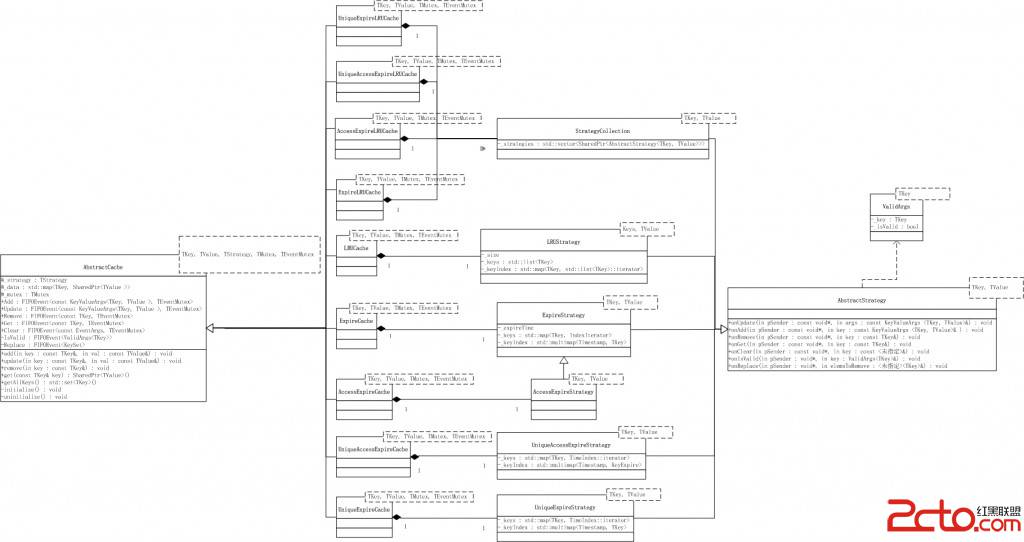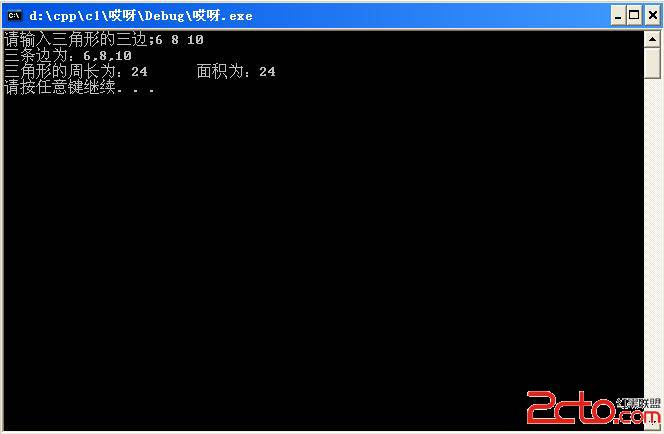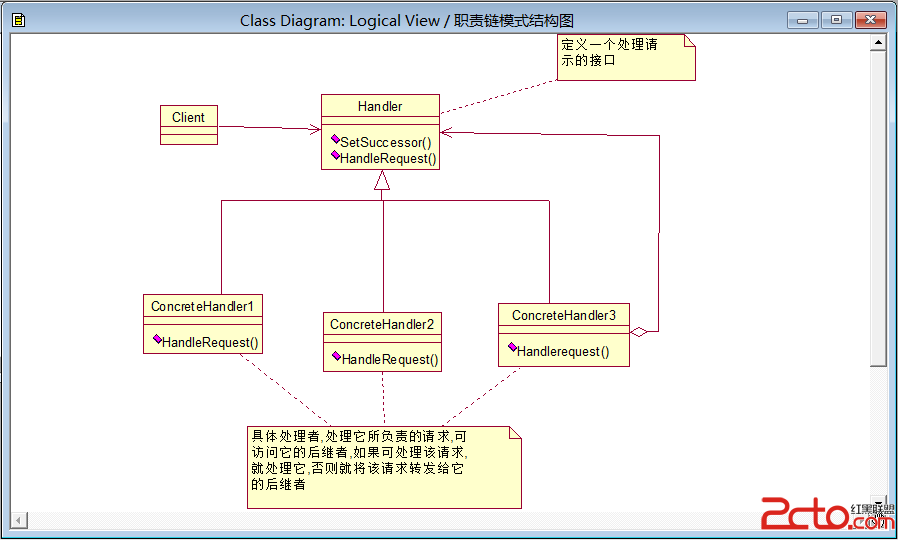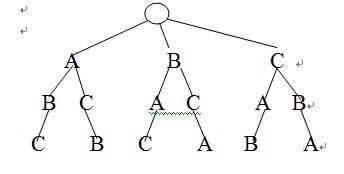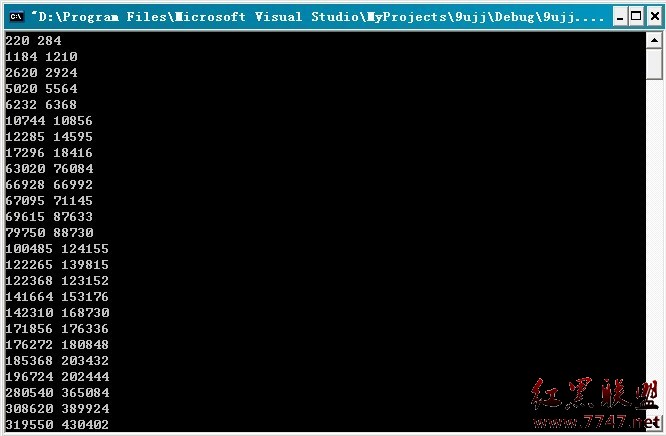POCO C++库学习和分析 -- Cache
POCO C++库学习和分析 -- Cache1. Cache概述在STL::map或者STL::set中,容器的尺寸是没有上限的,数目可以不断的扩充。并且在STL的容器中,元素是不会自动过期的,除非显式的被删除。Poco的Cache可以被看成是STL中容器的一个扩充,容器中的元素会自动过期(即失效)。在Poco实现的Cache框架中,基础的过期策略有两种。一种是LRU(Last Recent Used),另外一种是基于时间的过期(Time based expiration)。在上述两种过期策略之上,还提供了两者之间的混合。下面是相关的类:1. LRUCache: 最近使用Cache。在内部维护一个Cache的最大容量M,始终只保存M个元素于Cache内部,当第M+1元素插入Cache中时,最先被放入Cache中的元素将失效。2. ExpireCache: 时间过期Cache。在内部统一管理失效时间T,当元素插入Cache后,超过时间T,则删除。3. AccessExpireCache: 时间过期Cache。同ExpireCache不同的是,当元素被访问后,重新开始计算该元素的超时时间,而不是只从元素插入时开始计时。4. UniqueExpireCache: 时间过期Cache。同ExpireCache不同的是,每一个元素都有自己单独的失效时间。5. UniqueAccessExpireCache:时间过期Cache。同AccessExpireCache不同的是,每一个元素都有自己单独的失效时间。6. ExpireLRUCache:时间过期和LRU策略的混合体。当时间过期和LRU任一过期条件被触发时,容器中的元素失效。7. AccessExpireLRUCache:时间过期和LRU策略的混合体。同ExpireLRUCache相比,当元素被访问后,重新开始计算该元素的超时时间,而不是只从元素插入时开始计时。8. UniqueExpireLRUCache:时间过期和LRU策略的混合体。同ExpireLRUCache相比,每一个元素都有自己单独的失效时间。9. UniqueAccessExpireLRUCache:时间过期和LRU策略的混合体。同UniqueExpireLRUCache相比,当元素被访问后,重新开始计算该元素的超时时间,而不是只从元素插入时开始计时。2. Cache的内部结构2.1 Cache类下面是Poco中Cache的类图:从类图中我们可以看到所有的Cache都有一个对应的strategy类。事实上strategy类负责快速搜索Cache中的过期元素。Cache和strategy采用了Poco中的同步事件机制(POCO C++库学习和分析 -- 通知和事件 (四) )。让我们来看AbstractCache的定义:[cpp]template <class TKey, class TValue, class TStrategy, class TMutex = FastMutex, class TEventMutex = FastMutex>class AbstractCache/// An AbstractCache is the inte易做图ce of all caches.{public:FIFOEvent<const KeyValueArgs<TKey, TValue >, TEventMutex > Add;FIFOEvent<const KeyValueArgs<TKey, TValue >, TEventMutex > Update;FIFOEvent<const TKey, TEventMutex> Remove;FIFOEvent<const TKey, TEventMutex> Get;FIFOEvent<const EventArgs, TEventMutex> Clear;typedef std::map<TKey, SharedPtr<TValue > > DataHolder;typedef typename DataHolder::iterator Iterator;typedef typename DataHolder::const_iterator ConstIterator;typedef std::set<TKey> KeySet;AbstractCache(){initialize();}AbstractCache(const TStrategy& strat): _strategy(strat){initialize();}virtual ~AbstractCache(){uninitialize();}// ...........protected:mutable FIFOEvent<ValidArgs<TKey> > IsValid;mutable FIFOEvent<KeySet> Replace;void initialize()/// Sets up event registration.{Add += Delegate<TStrategy, const KeyValueArgs<TKey, TValue> >(&_strategy, &TStrategy::onAdd);Update += Delegate<TStrategy, const KeyValueArgs<TKey, TValue> >(&_strategy, &TStrategy::onUpdate);Remove += Delegate<TStrategy, const TKey>(&_strategy, &TStrategy::onRemove);Get += Delegate<TStrategy, const TKey>(&_strategy, &TStrategy::onGet);Clear += Delegate<TStrategy, const EventArgs>(&_strategy, &TStrategy::onClear);IsValid += Delegate<TStrategy, ValidArgs<TKey> >(&_strategy, &TStrategy::onIsValid);Replace += Delegate<TStrategy, KeySet>(&_strategy, &TStrategy::onReplace);}void uninitialize()/// Reverts event registration.{Add -= Delegate<TStrategy, const KeyValueArgs<TKey, TValue> >(&_strategy, &TStrategy::onAdd );Update -= Delegate<TStrategy, const KeyValueArgs<TKey, TValue> >(&_strategy, &TStrategy::onUpdate);Remove -= Delegate<TStrategy, const TKey>(&_strategy, &TStrategy::onRemove);Get -= Delegate<TStrategy, const TKey>(&_strategy, &TStrategy::onGet);Clear -= Delegate<TStrategy, const EventArgs>(&_strategy, &TStrategy::onClear);IsValid -= Delegate<TStrategy, ValidArgs<TKey> >(&_strategy, &TStrategy::onIsValid);Replace -= Delegate<TStrategy, KeySet>(&_strategy, &TStrategy::onReplace);}void doAdd(const TKey& key, const TValue& val)/// Adds the key value pair to the cache./// If for the key already an entry exists, it will be overwritten.{补充:软件开发 , C++ ,上一个:刨根问底系列之C++ 类型转换挖掘
下一个:最大字段求和问题
- 更多C/C++疑问解答:
- 关于c++的cout输出的问题。
- 在学校里学过C和C++,不过学的很一般,现在自学C#,会不会很难?
- 全国计算机二级C语言笔试题
- 已知某树有2个2度结点,3个3度结点,4个4度结点,问有几个叶子结点?
- c++数据结构内部排序问题,整数排序
- 2012九月计算机二级C语言全国题库,,急求急求
- 如果assert只有一个字符串作为参数,是什么意思呢?
- C语言中,哪些运算符具有左结合性,哪些具有右结合性,帮忙总结下,谢谢了!
- 为什么用结构体编写的程序输入是,0输不出来啊~~~
- 将IEEE—754的十六进制转化为十进制浮点类型,用C或C++都行,多谢各位大侠啊,非常感谢!
- 为什么这个程序求不出公式?
- 这个链表倒置的算法请大家分析下
- c语言函数库调用
- C语言unsigned int纠错
- C语言快排求解啊
